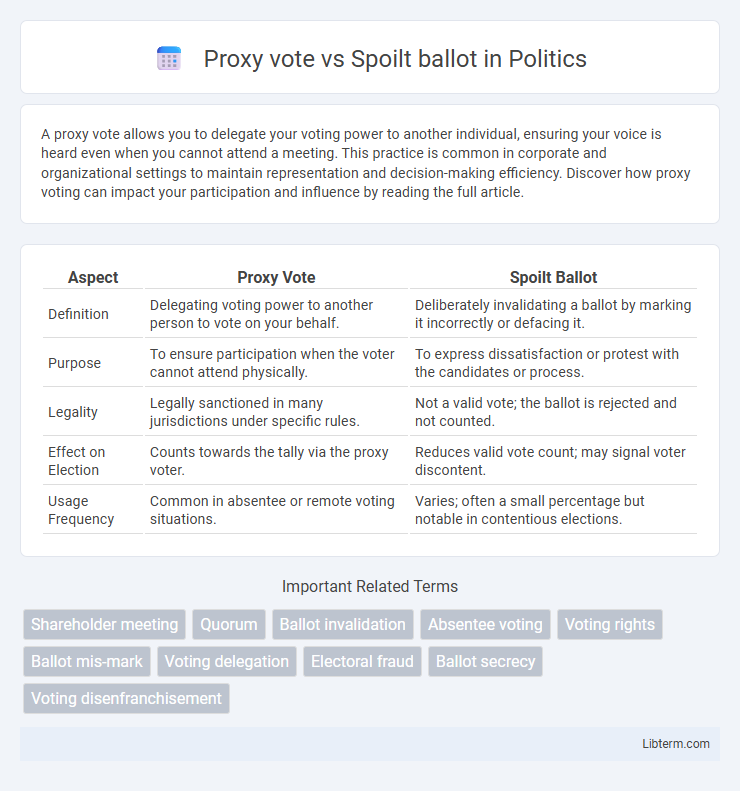A proxy vote allows you to delegate your voting power to another individual, ensuring your voice is heard even when you cannot attend a meeting. This practice is common in corporate and organizational settings to maintain representation and decision-making efficiency. Discover how proxy voting can impact your participation and influence by reading the full article.
Table of Comparison
| Aspect | Proxy Vote | Spoilt Ballot |
|---|---|---|
| Definition | Delegating voting power to another person to vote on your behalf. | Deliberately invalidating a ballot by marking it incorrectly or defacing it. |
| Purpose | To ensure participation when the voter cannot attend physically. | To express dissatisfaction or protest with the candidates or process. |
| Legality | Legally sanctioned in many jurisdictions under specific rules. | Not a valid vote; the ballot is rejected and not counted. |
| Effect on Election | Counts towards the tally via the proxy voter. | Reduces valid vote count; may signal voter discontent. |
| Usage Frequency | Common in absentee or remote voting situations. | Varies; often a small percentage but notable in contentious elections. |
Introduction to Proxy Vote and Spoilt Ballot
Proxy voting allows a designated individual to cast a ballot on behalf of an absent voter, ensuring their participation in elections or meetings. A spoilt ballot occurs when a ballot paper is improperly marked, torn, or defaced, rendering the vote invalid and excluded from the final count. Understanding the distinct roles of proxy votes and spoilt ballots is essential for accurate election administration and voter representation.
Understanding Proxy Voting: Definition and Process
Proxy voting allows a designated individual to cast a vote on behalf of another member, ensuring representation even when the voter is absent. This process involves formal authorization, often through a written or electronic proxy form, to delegate voting rights. Unlike a spoilt ballot, which is invalid due to errors or markings, proxy votes are legitimate and counted as part of the decision-making process.
What Constitutes a Spoilt Ballot?
A spoilt ballot occurs when a voter incorrectly marks a ballot paper, making their vote invalid and uncountable in the final tally. Common reasons include selecting multiple candidates in a single-choice election, leaving the ballot blank, or marking outside designated areas, leading to ambiguity about voter intent. Unlike a proxy vote, where an authorized person votes on behalf of another, a spoilt ballot represents a miscast or unintentionally voided vote that does not contribute to election results.
Legal Framework: Proxy Vote vs Spoilt Ballot
The legal framework governing proxy votes establishes specific conditions under which a voter may delegate their voting power to another individual, with clear documentation and identity verification to ensure legitimacy. In contrast, spoiled ballots are subject to election laws that define disqualification criteria, such as markings that render the intent ambiguous, thereby invalidating the vote. Differences in legal provisions ensure proxy votes are recognized and counted when properly authorized, while spoiled ballots are excluded from the final tally to maintain electoral integrity.
Reasons for Using Proxy Voting
Proxy voting is often used to ensure shareholder or member participation when individuals cannot attend meetings due to travel, health issues, or scheduling conflicts. Unlike spoilt ballots, which result from errors or deliberate invalidation, proxy votes are intentionally granted to trusted representatives to influence decisions effectively. This method enhances democratic involvement by allowing absentee voters to contribute to governance without being physically present.
Common Causes of Spoilt Ballots
Spoilt ballots commonly result from voters incorrectly marking multiple options or leaving the ballot blank, confusing instructions, or physical damage to the ballot paper. Proxy votes differ as they involve a designated person voting on behalf of another, reducing individual voter errors but increasing the need for strict verification to prevent fraud. Understanding the causes of spoilt ballots, such as unclear ballot design and voter misunderstanding, helps improve election accuracy and legitimacy.
Impact on Election Outcomes
Proxy votes can significantly influence election outcomes by allowing individuals to delegate their voting power, often consolidating influence within certain groups or organizations. Spoilt ballots, reflecting improperly marked or intentionally invalid votes, reduce the total count of valid votes, potentially altering majority thresholds and affecting close races. Understanding the impact of proxy voting and spoilt ballots is crucial for accurately interpreting election results and ensuring fair representation.
Safeguards and Challenges for Proxy Votes
Proxy votes enable shareholders to delegate voting power, ensuring participation despite physical absence, but they require stringent verification safeguards such as identity authentication and clear authorization to prevent fraud. Safeguards include secure submission channels, transparency in proxy instructions, and audit trails to detect manipulation or coercion. Challenges encompass risks of proxy misuse, voter coercion, and potential disenfranchisement if proxies are mishandled or votes are misrepresented compared to the straightforward invalidation of spoilt ballots.
Reducing Spoilt Ballots: Best Practices
Implementing clear instructions and user-friendly ballot designs significantly reduce spoilt ballots, ensuring that voter intent is accurately captured. Proxy votes enable authorized representatives to cast ballots on behalf of absent voters, minimizing errors caused by misfilled votes and increasing overall ballot validity. Educating voters on proper ballot completion and proxy voting procedures reinforces accurate vote counting and strengthens election integrity.
Choosing Between Proxy Vote and Direct Participation
Choosing between proxy voting and direct participation impacts the authenticity and representation of voter intent in elections. Proxy votes enable delegation of decision-making power to a trusted representative, ensuring participation despite absence, while direct votes allow individuals to express personal choices firsthand, minimizing misinterpretation. Evaluating factors such as voter availability, confidence in the proxy, and the importance of firsthand decision-making guides optimal engagement in the electoral process.
Proxy vote Infographic

 libterm.com
libterm.com